On May 24, continuing the 5th session, the National Assembly discussed in the hall a number of contents with different opinions in the draft Law on Bidding (amended). On the sidelines of the session, SGGP reporters discussed with National Assembly deputies related to the health sector mentioned in this draft law.
No breakthrough in the field of medicine and medical equipment
* REPORTER: How do delegates evaluate the draft Law on Bidding (amended) in the health sector?
- Delegate DINH NGOC QUY ( Standing Member of the Social Committee of the National Assembly ) : Regarding the health sector mentioned in the draft Law on Bidding (amended) this time, I think that, in addition to the issue of price, attention should be paid to the quality and effectiveness of treatment. The quality factors mentioned in the draft law are not expressed much, not really clear, still focusing on price criteria.
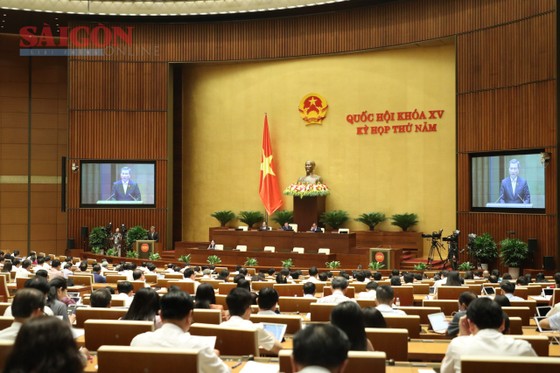 |
National Assembly meeting on May 24. Photo: QUANG PHUC |
Many delegates also expressed the opinion that if we base on price, it will be difficult to achieve the goal of harmony between quality and price. There were also delegates who, during their supervision at health departments, mentioned the issue of falling into cheap healthcare if we are not careful.
Therefore, in this draft Law on Bidding (amended), there is a provision giving priority to domestically produced drugs that meet the requirements of good manufacturing practices according to European standards or equivalent. However, specific instructions to determine the ratio between price and quality of drugs and medical equipment are assigned to the Government for detailed regulations.
- Delegate PHAM KHÁNH PHONG LAN (Head of the Food Safety Committee of Ho Chi Minh City) : I think that this draft Law on Bidding (amended) has not made any breakthrough in the field of medicine and medical equipment. The draft only mentions centralized procurement but in the end it is still through open bidding. In addition, there are no regulations such as strengthening price negotiations, how to appoint contractors in emergency cases and the doctor's evaluation criteria have not been included as criteria in the technical score.
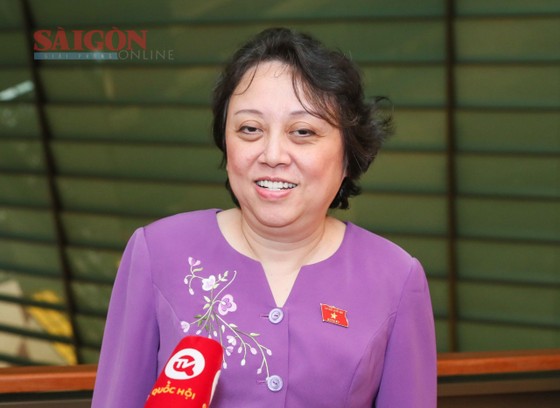 |
National Assembly Delegate Pham Khanh Phong Lan. Photo: QUANG PHUC |
During this session, I regret that the decree and circular accompanying the draft Law on Bidding (amended) were not submitted to the National Assembly. In fact, the sub-law documents themselves have self-tightening regulations that are difficult to apply when the law comes into effect.
* According to the delegate, will there be detailed instructions if the draft law is passed?
- Delegate DINH NGOC QUY: The Bidding Law is quite complicated, with many procedures and many binding conditions, and many participating entities. This time, the authorities discussed very carefully, even the units directly from the medical facilities worked with the drafting committee, the editorial team, the presiding agency, and the presiding agency to discuss these issues.
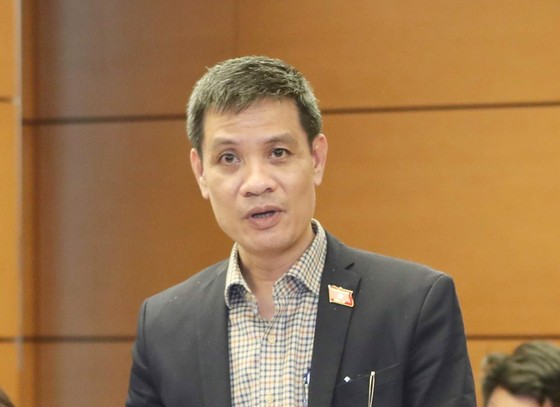 |
National Assembly Delegate Dinh Ngoc Quy. Photo: QUANG PHUC |
Therefore, the draft Law on Bidding (amended) this time has clearly stipulated, I think that in the way of organization and implementation, how can all parties agree and understand the provisions of the law? There are two issues here, that is, the law stipulates very specific principles, criteria, and conditions. As for the detailed criteria, the National Assembly will assign the Government to stipulate.
* Go into detail that the draft law stipulates bidding in cases of emergency care for patients, not in urgent cases?
- Delegate PHAM KHÁNH PHONG LAN : This draft of the Law on Bidding (amended) has invested in and absorbed many opinions. However, in the medical field, especially in the bidding for the purchase of drugs, equipment, and medical supplies, there are still many shortcomings.
National Assembly Delegate Pham Khanh Phong Lan talks with reporters. By: VAN MINH |
In particular, I think it is necessary to clearly state which cases are urgent, to avoid the situation where there are many different ways to define what is an urgent case to carry out the bidding.
- Delegate NGUYEN TRI THUC ( Director of Cho Ray Hospital) : I agree with delegate Pham Khanh Phong Lan. In the draft law, it is necessary to adjust, replace and supplement the emergency situation in healthcare to cover real-life situations such as: sudden breakdown of medical equipment, broken CT scanner light bulb, no diagnostic equipment for patients.
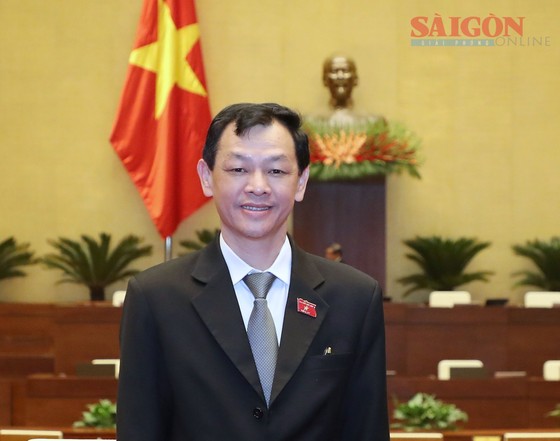 |
National Assembly Delegate Nguyen Tri Thuc. Photo: QUANG PHUC |
Currently, the high number of patients has caused a shortage of drugs, medical supplies, etc. in upper-level hospitals. These situations are not emergencies, but urgent situations. Therefore, the law needs to allow for short-term bidding to respond promptly and quickly to the purchase of drugs, medical supplies, etc. to treat patients.
Focus on quality over price
* Recently, medical facilities have reported that the quality of cheap bidding drugs is not as expected?
- Delegate DINH NGOC QUY : This is an issue that medical facilities themselves have been reflecting on a lot recently, especially with regard to drugs and medical equipment related to the payment list from health insurance, which are often cheap drugs and of unsatisfactory quality.
Therefore, at the seminars, experts, managers, and medical facilities proposed to empower the medical council at medical facilities or the hospital management board to decide on treatment effectiveness parameters.
Because only medical facilities that directly care for, treat, and examine patients can evaluate treatment effectiveness and make appropriate drug choices.
- Delegate PHAM KHÁNH PHONG LAN: Bidding is a means, not a goal, so bidding is a way to buy products using the State budget with acceptable quality and the cheapest price.
On the other hand, in bidding for drugs, medical equipment... according to the regulations in Circular 14 of the Ministry of Health on establishing a planned price before bidding and the winning bid price must be lower than the planned price. We only attract bidders who prioritize price over quality.
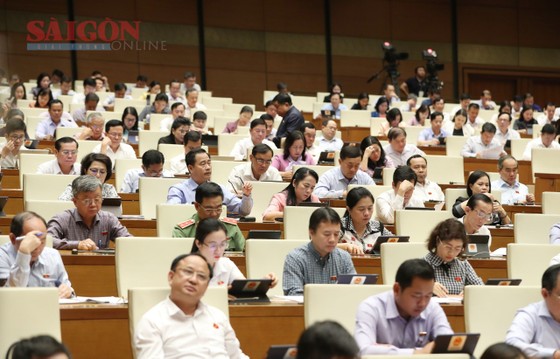 |
National Assembly delegates attend the meeting on May 24. Photo: QUANG PHUC |
From there, we can save money, but the patient recovers slowly, the treatment days increase, the reputation of doctors is lost, the reputation of the health insurance system is lost, that is the problem. In addition, this leads to the lack of sustainable development of the pharmaceutical industry, medical equipment... in the country.
* So, according to the delegate, what is the ideal ratio between price and quality criteria?
- Delegate DINH NGOC QUY : I think that in the bidding scale, the quality ratio should be about 70%, which is ideal. Hopefully, when this draft law is passed, the Government will have detailed instructions on implementation in the spirit of the quality criterion accounting for a higher and appropriate ratio. The price criterion is only a factor in the bidding evaluation and selection process.
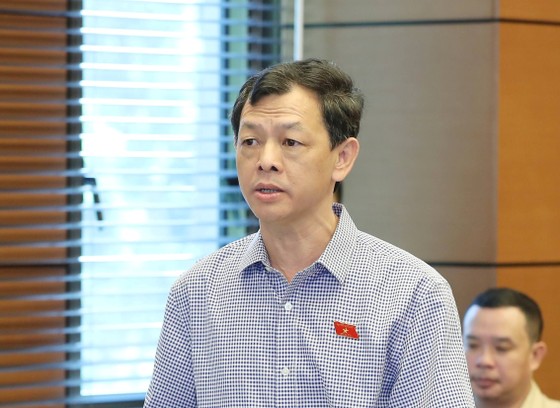 |
National Assembly Delegate Nguyen Tri Thuc. Photo: QUANG PHUC |
* For large, special hospitals, choosing a contractor to supply drugs, chemicals, and medical equipment is difficult?
- Delegate NGUYEN TRI THUC: The draft Law on Bidding (amended) submitted to the National Assembly this time does not stipulate the selection of contractors to provide specialized medical equipment. Meanwhile, specialized medical equipment has its own characteristics of the medical sector, there are equipment directly related to patient treatment, health and life of patients, all of which are high-tech medical equipment.
Upper-level and special-class hospitals are in great need, but the draft law currently does not specifically stipulate or allow the selection of brands and countries of manufacture for bidding.
If there are no regulations, it is very likely that you will buy equipment from poor brands, manufactured in third countries because they compete very strongly on price while the quality and durability of the equipment is not as good as that produced in advanced developed countries.
From there, I propose to add regulations on selecting contractors to supply specialized medical equipment, contractors providing repair, maintenance and replacement services for specialized medical equipment components. In addition to considering price factors, regulations must also consider the efficiency of use, durability of the equipment, manufacturer, and country of manufacture.
At the same time, it is necessary to supplement and allow special-class hospitals and above to choose the brand and country of manufacture in purchasing high-tech, specialized treatment equipment that is suitable for the disease model and trained human resources of that medical facility.
Source


![[Photo] President Luong Cuong presents the 40-year Party membership badge to Chief of the Office of the President Le Khanh Hai](https://vphoto.vietnam.vn/thumb/1200x675/vietnam/resource/IMAGE/2025/5/19/a22bc55dd7bf4a2ab7e3958d32282c15)
![[Photo] Close-up of Tang Long Bridge, Thu Duc City after repairing rutting](https://vphoto.vietnam.vn/thumb/1200x675/vietnam/resource/IMAGE/2025/5/19/086736d9d11f43198f5bd8d78df9bd41)


![[Photo] General Secretary To Lam attends the conference to review 10 years of implementing Directive No. 05 of the Politburo and evaluate the results of implementing Regulation No. 09 of the Central Public Security Party Committee.](https://vphoto.vietnam.vn/thumb/1200x675/vietnam/resource/IMAGE/2025/5/19/2f44458c655a4403acd7929dbbfa5039)
![[Photo] Panorama of the Opening Ceremony of the 43rd Nhan Dan Newspaper National Table Tennis Championship](https://vphoto.vietnam.vn/thumb/1200x675/vietnam/resource/IMAGE/2025/5/19/5e22950340b941309280448198bcf1d9)


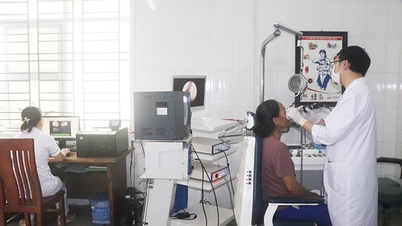






















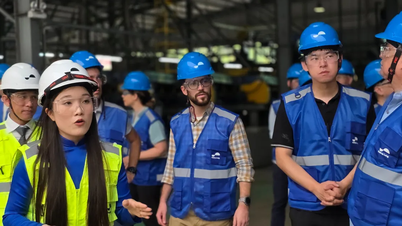





























































![[VIDEO] - Enhancing the value of Quang Nam OCOP products through trade connections](https://vphoto.vietnam.vn/thumb/402x226/vietnam/resource/IMAGE/2025/5/17/5be5b5fff1f14914986fad159097a677)



Comment (0)